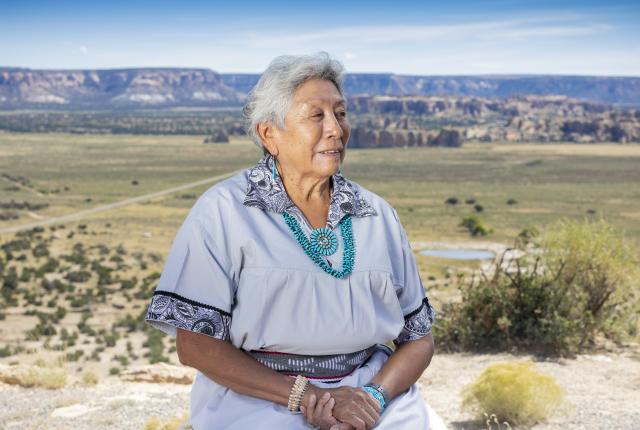Above: Bonnie Leno has taught more than 125 students to speak Keres in the past 10 years at the Acoma Learning Center & Library. Photograph by Gabriella Marks.
BONNIE LENO KNOWS ACOMA PUEBLO'S traditional lifeways depend on the survival of her heritage language. As one of two instructors at the Acoma Learning Center & Library, she’s taught more than 125 students to speak Keres in the past 10 years. But since 1990, the number of Keres-speaking people has become critically low, as many of Acoma’s younger generations speak only English.
“We’re kind of divided,” says the 71-year-old Leno. “If the language could be brought back, there would be so much more harmony in this village, this community, this tribe.”
It’s always been tough, but then the pandemic hit. In March 2020, Leno, her son, and her grandson all contracted covid-19. Leno spent two weeks in an Albuquerque hospital, and classes at the Acoma Learning Center were canceled until August, when they could be moved online.
“I am not a computer person,” Leno says with a chuckle about her two-hour class, which meets twice weekly.
Without in-person contact, it’s difficult to convey tone and intonation for a language that’s been spoken for thousands of years but never written. “We used to have activities to use the language in the classroom,” she says. “It’s kind of hard over the screen.”
Leno improvises to keep students engaged. When a lesson included plants and trees, she took a solo trip into the mountains to gather branches and flowers. “They were so happy, because they could put the name of each item to the actual thing,” she says.
Stephanie Oyenque, one of Leno’s students, who works in Albuquerque Public Schools’ Indian Education Department, appreciates the extra effort. “She reminds me of my mother and aunties,” Oyenque says. “They’re very stern, in a good way. She wants us to learn, and she wants us to carry on the language.”
Although Leno learned English in school, she spoke Keres at home. Her mother died when she was five years old, and her grandparents, who spoke only Keres, were a huge influence. “I grew up the old-fashioned, traditional way,” she recalls. “My grandfather used to say, ‘I want you to use the English, Granddaughter, because that’s what you’re going to use in the future.’ Now it seems like we’re going backward. We’re going to teach our young people the language again.”
Before her husband, Robert, passed away in 2018, the couple often gathered community members in their backyard for small classes.
“Our language is a way to communicate to many deities—animals, spirits,” Oyenque says. “It’s a way for them to understand what our prayers are for the world. Our ancestors didn’t speak English, they spoke Acoma, and we want them to be able to hear our prayers, hear our success stories, hear our challenges, because it’s they who will answer our prayers.”
As Leno’s classes continue online, she is grateful to be teaching something she believes can unite the people of Acoma Pueblo. “It’s about preserving the culture, the language, the traditions, taking care of the people, and assuring the future,” she says.
True Heroes
Read more about the 10 individuals who went above and beyond to support our communities.


